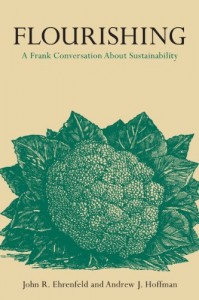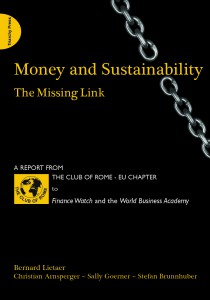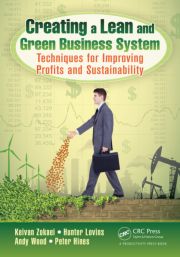Several recent books reflect an environmental movement broadening and shifting into a higher gear of urgency. Keeping up is becoming harder. Below is a quick rundown on three books. The first two are “think” pieces that diverge from the norm. However, for those into lean thinking, scroll down to the third one. Starting a transition from lean to green is a smaller leap, and you can meet two of the authors at a workshop on June 25.
 Flourishing: John Ehrenfeld and Andrew Hoffman, 2013: Ehrenfeld is professor emeritus from MIT, and Hoffman is a former student now on the faculty of the University of Michigan. Both dealt with many technical aspects of sustainability for years. However, this 150-page book is a wide-ranging conversation between them on our major problem dealing with sustainability – us. Our human nature and our human institutions tend to lock us into a doomsday trajectory. Getting untracked is a big challenge. Huge technical and economic challenges will become tractable only if we accept that they must be approached differently. We must move beyond the trap of the triple bottom line.
Flourishing: John Ehrenfeld and Andrew Hoffman, 2013: Ehrenfeld is professor emeritus from MIT, and Hoffman is a former student now on the faculty of the University of Michigan. Both dealt with many technical aspects of sustainability for years. However, this 150-page book is a wide-ranging conversation between them on our major problem dealing with sustainability – us. Our human nature and our human institutions tend to lock us into a doomsday trajectory. Getting untracked is a big challenge. Huge technical and economic challenges will become tractable only if we accept that they must be approached differently. We must move beyond the trap of the triple bottom line.
By Flourishing, the authors mean that everything on earth should flourish, humans along with everything else.
The authors note that present sustainability efforts are far from enough. “At this moment in time, almost everything being done in the name of sustainability entails attempts to reduce unsustainability. But reducing unsustainability, although critical, does not and will not create sustainability.”
Other books and sources make this point, but go on to recommend specific technical, political, or economic changes. Ehrenfeld and Hoffman don’t. They state that first we need to change. We need to tell ourselves a different story, one that builds within us a fundamentally different belief system as a platform on which we can collectively act. Although impossible to fully grasp from a few words, this is a transition in gut level beliefs from a state of having to one of being; and from one of needing to one of caring. To do this, you have to think deeply. You can’t get there from here, but must find somewhere else from which to start. Serious mindset change takes serious reflection.
The authors advocate a much more holistic concept of science. We can’t go back to pre-scientific thinking and survive, but the present system of rational rules and procedures for making public decisions is breaking down. Nature has too many complex feedback loops for us ever to fully comprehend, or to construct models that do. No problem has a final, complete answer. We are part of systems that are ever changing, and in ways that we can never precisely predict.
Therefore, we don’t really “fix” problems. We intervene in systems. If a perturbation seems to move system functioning favorably, good. If not, try something else – if it is well thought out, of course.
Although short, this is a pretty mind-bending book. If you are intrigued, read it in full.
 Money and Sustainability: The Missing Link: Bernard Lietaer, Christian Arnsperger, Sally Goerner, and Stefan Brunnhuber. Published last year, this book is a major break from most writing about sustainability. Leitaer, a key author, is a well-known architect of currencies, including local, alternative currencies. Those passionate about ecological sustainability are concluding that doing something about it is impossible without substantially changing the financial system and financial thinking.
Money and Sustainability: The Missing Link: Bernard Lietaer, Christian Arnsperger, Sally Goerner, and Stefan Brunnhuber. Published last year, this book is a major break from most writing about sustainability. Leitaer, a key author, is a well-known architect of currencies, including local, alternative currencies. Those passionate about ecological sustainability are concluding that doing something about it is impossible without substantially changing the financial system and financial thinking.
One can see the influence of this book on other sustainability messages. Its basic premises start with the conflict between “efficiency” and “resilience” within a system. However, one must examine the context in which these terms are used. By efficiency they mean excessive specialization or concentration. By resilience they mean a system’s ability to withstand unexpected happenings and recover from major upsets. For example, an airline’s operations must be resilient to both minor and major weather events.
Readers into lean thinking understand that systems with limited capacity to adapt to change are not even efficient churning out production. If workers and equipment are too specialized, or dependent on a single sequence of complex machines, one little software glitch or a malfunction of one component can stop the entire flow of production.
This report generalizes that thinking to ecosystems, economic systems, and financial systems. In ecosystems, reducing biodiversity erodes the balance of nature that self-corrects pathogenic disturbances before they become disastrous. In a human or animal body this is a weakening of the immune system. Reduction in resilience is why agricultural monocropping is high risk. If resistance to a pathogen is not built into both crop genetics and its surrounding ecosystem, a pathogen can wipe out a big chunk of the food supply before a countermeasure can be taken. That actually happened on a big scale in the Irish potato famine of 1845-46.
Similarly, a company overly dependent on one customer is hard hit if that customer disappears, and an economy dependent on one industry is hard hit if that industry collapses. Likewise, a financial system dependent on institutions “too big to fail” is highly vulnerable. If a pathogen like mortgage defaults infects a system internally unable to absorb the losses of clearing the defaults, the whole system is in danger of crashing. Even if banks were smaller, if they lock themselves into a “monocrop” situation by using counterparty derivative trading, unwinding this complexity to re-finance mortgages entails a lot of side effects even if banks are willing to take this tough medicine.
Trying to ameliorate this situation with detailed regulation is self-defeating, and a symptom of a sick system with weakened self-regulatory capacity, the financial equivalent of an immune system. Creation of the money that lubricates transactions is part of that system, and it’s a choke point used to control the system. Therefore, a monopoly on creating money is as dysfunctional as any other economic monopoly, the equivalent of monocropped agriculture and suburbanization crowding out the natural biodiversity that keeps a region’s biosphere flourishing.
The current financial system has developed low resilience because of blind dependence on infinite growth on a finite planet. Most financial formulas and economic models assume unlimited growth. Political and economic arguments debate how to kick start economic growth. These arguments should be obsolete. The system is trying to do something that it can no longer do. It generates huge public and private debt that future growth cannot pay off, growing imbalance in wealth accumulation, and fights about wealth redistribution. The system is unable to meet 21st century needs.
Economic monopolies create booms and busts, and when extreme, violent redistributions of wealth. In nature, monopolies create overshoot and collapse. Regulations may moderate bubbles and pops, but they don’t stop them. It is time to change fundamentals, creating inherently more resilient economic systems consistent with biosphere sustainability.
Proposed countermeasures resemble a Free Money Movement, a phrase coined by the economist Friedrich Hayek in his book Denationalization of Money (1976). If you like free markets, why not have competition for monetary systems too?
One countermeasure is abolition of fractional reserve banking. Governments would issue money directly rather than the Federal Reserve or comparable central bank expanding and contracting the money supply by banks “borrowing” from the Fed and multiplying monetary expansion when they enter loans on their books. Instead prohibit banks from lending more than they take in deposits, so they can’t balloon borrowing from the Fed into “profligate” lending. This proposal was called the Chicago Plan, bandied in the 1930s, but never enacted, although backed by Milton Friedman among other economists.
However, this Chicago Plan has drawbacks. One is that a government may wildly issue money, which has happened in countries with central public banks, for example Zimbabwe. Another is that when done on a national scale, this is no pilot project, but a big experiment with possibilities for unforeseen consequences.
Instead the report’s recommendations follow a quote from Friedrich Hayek, “What is now urgently required is not the construction of a new system, but the prompt removal of all the legal obstacles which have for two thousand years blocked the way for an evolution which is bound to throw up beneficial results which we cannot now foresee.”
That is, we must learn our way into these changes. And we need to learn quickly.
As examples, the report cites a number of both private and government initiatives, all at a local or small regional level. All are intended to promote desirable behavior and local collaboration. Many also employ some version of a local alternative currency. However, an initiative that works in one local and cultural setting may not work in others. That’s what makes this a big learning adventure.
The examples cannot be explained in detail in a review. A fascinating one is Doras from Doraland, intended to turn Lithuania into a “learning country.” The Doraland Foundation issues Doras to people who teach or tutor others. In turn, recipients can give their Doras to those who teach or coach them. This seems to be creating a budding learning economy. Non-profits with novel ideas for “Dora learning” are springing up. Trades can be made and tracked by cell phone. (Lithuanians have more cell phones than anyone in the world, 1.2 cell phones per capita.)
Wellness tokens have been used to reward people for maintaining specific preventive health activities, thereby fostering a wellness economy. “Natural” savings plans let individuals invest in important ecological areas, like forests and preserves, issuing currency markers to volunteers that help sustain them – so these are also savings plans with payoffs many generations in the future, not short term.
Many communities issue civic currency markers to volunteers giving time to the community. One hour’s service earns you one Civic. Then community citizens multiply the effect by trading Civics among themselves for services they perform for each other, thus promoting both collaboration and the local economy. In the United States, the Ithica Hour (New York) is the oldest, best-known example of a Civic currency.
A well-known example that does not using an alternative currency is the Grameen Bank, a microfinance system making small loans to destitute entrepreneurs. Its success in poor countries earned Muhammed Yunus a Nobel Prize, but success also invited imitation by operators that regard microfinance as too good a money making opportunity to pass.
Another example is a system called C3 for supply chains. A big, stable customer company’s invoice or legal promise to pay a first tier supplier can be insured very cheaply. Then the first tier supplier converts it into a basis for clearing accounts with its lower tier suppliers. The tier one supplier sends “clearing funds” to its suppliers, who can pass them on down to their suppliers. When the big customer pays, all players can cash in their C3 IOUs for a national currency. C3 systems that provide liquidity to keep a supply chain going despite long delays in payment have been successful in South America.
The authors do not regard any idea as a panacea. Any system that people can set up, they can screw up, so more than a financial revolution is necessary to cope with our environmental crises. However, the report proposes that a financial revolution is necessary, but insufficient. You can learn more from the book, of course, and from its web sites.
 Creating a Lean and Green Business System: Keivan Zokaei, Hunter Lovins, Andy Wood, and Peter Hines. This book, hot off the press, is for the company “somewhere in lean” and interested in improving the environment. Hunter Lovins, well known in the environmental community, is the only American author. The other three are British, and well known in the lean community in the United Kingdom, so they blend lean and green.
Creating a Lean and Green Business System: Keivan Zokaei, Hunter Lovins, Andy Wood, and Peter Hines. This book, hot off the press, is for the company “somewhere in lean” and interested in improving the environment. Hunter Lovins, well known in the environmental community, is the only American author. The other three are British, and well known in the lean community in the United Kingdom, so they blend lean and green.
The outstanding feature of this book is four extensive case studies of medium-to-large companies in Britain and Europe using lean thinking to make substantial progress on sustainability goals. All are financially stable too, alleviating fears that substantive measures to deal with sustainability risks financial disaster. Business readers can relate to the leadership needed to progress in real companies that at the same time are beset by other business issues and the usual corporate complexity. The cases:
Toyota Motor Europe
Adnams Brewery
Tesco PLC
Marks & Spencer
The book also describes some “tools” used. Lean tools are not hard to find elsewhere, so topped off by the presentation here, this book may inspire others to route a lean journey toward green, or if they are already on that journey, pick up the pace.
Two of the authors (Zokaei and Lovins) will be in Chicago on June 25 to present a day-long workshop on lean-to-green as outlined in the book. They may discuss more of the details of some of the cases presented. The webpage for this workshop is here, and you can register for it here.
